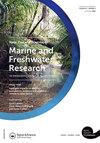Combining a novel outplant module with metareplication to further abalone restoration capacity in California
IF 1.7
4区 环境科学与生态学
Q3 FISHERIES
New Zealand Journal of Marine and Freshwater Research
Pub Date : 2023-10-18
DOI:10.1080/00288330.2023.2266382
引用次数: 0
Abstract
ABSTRACTSpecies reintroductions require large resource investments for rearing and placement and are further complicated by the paucity of robust monitoring regimes. Nonetheless, continued population declines in many species necessitate such actions. The white abalone (Haliotis sorenseni) in California has experienced steep population declines and a reintroduction programme through outplanting juvenile, captive-bred abalone is considered necessary for its recovery. A novel module known as the Short-term Abalone Fixed Enclosure (SAFE) was developed to allow red abalone (H. rufescens), a surrogate species that is not endangered and co-occurs with white abalone, a period of adjustment before dispersing. Outplant events were conducted at multiple sites in California, USA and monitored regularly for shells and live animals in a process known as metareplication, considered essential for robust outplant reporting. Time-lapse cameras were also placed on SAFEs to document predator visitation. Live animals and shells both increased on-site throughout the first six months and declined thereafter, with most animals unaccounted for. Empty shells on site were considered a proxy for the mortality rate and the lack of encounters after a short period suggests successful emigration from modules into the reef habitat. Predator visitation was generally low, and no significant differences were found across outplant periods. Results from this study indicate outplant mortality may peak early and predator activity is generally low and unrelated to abalone introduction. This vital step illustrates this outplant method may be an effective tool in restoring abalone to subtidal rocky reefs.KEYWORDS: Abaloneoutplantrestorationmodulemetareplicationtemperate reefmonitoringpredation AcknowledgementsThe authors wish to thank the many divers that participated in abalone outplanting and site selection, as well as the crew of The Marissa, The Garibaldi and The Magician for safe transport and the Cultured Abalone Farm for supplying animals. Private stocking permit issued by the California Department of Fish and Wildlife pursuant to Fish and Game Code section 640.Disclosure statementNo potential conflict of interest was reported by the author(s).Additional informationFundingWork completed under contract AB133F17CN0158 and grant NA18NMF4540340 for the National Marine Fisheries Service.结合一种新型外植体模块和复育技术,进一步提高加州鲍鱼的恢复能力
摘要物种的重新引入需要在饲养和安置方面投入大量资源,并且由于缺乏强有力的监测机制而进一步复杂化。尽管如此,许多物种数量的持续下降使这些行动成为必要。加州的白鲍鱼(Haliotis sorenseni)数量急剧下降,通过放养幼鲍鱼的重新引入计划被认为是恢复其数量的必要措施。开发了一种称为短期鲍鱼固定圈养(SAFE)的新模块,允许红鲍鱼(H. rufescens)在分散之前有一段时间的调整,红鲍鱼是一种非濒危的替代物种,与白鲍鱼共存。外植事件在美国加利福尼亚州的多个地点进行,并定期监测贝壳和活体动物,这一过程被称为元复制,被认为是可靠的外植报告的必要条件。保险箱上还安装了延时摄像机,以记录捕食者的来访。活的动物和贝壳在头六个月都在增加,之后就减少了,大多数动物都下落不明。现场的空壳被认为是死亡率的代表,短时间内没有遭遇表明它们成功地从模块迁移到珊瑚礁栖息地。捕食者的造访率普遍较低,在不同的外植期没有发现显著的差异。本研究结果表明,外来植物死亡率可能较早达到峰值,捕食者活动通常较低,与鲍鱼引进无关。这一重要步骤表明,这种外植方法可能是将鲍鱼恢复到潮下岩礁的有效工具。作者要感谢参与鲍鱼外植和选址的众多潜水员,感谢玛丽莎号、加里波第号和魔术师号船员的安全运输,感谢养殖鲍鱼养殖场提供的动物。私人放养许可证由加州鱼类和野生动物部根据鱼类和野生动物法典第640节颁发。披露声明作者未报告潜在的利益冲突。根据合同AB133F17CN0158和国家海洋渔业局批准的NA18NMF4540340完成的工作。
本文章由计算机程序翻译,如有差异,请以英文原文为准。
求助全文
约1分钟内获得全文
求助全文
来源期刊
CiteScore
4.50
自引率
12.50%
发文量
35
审稿时长
3 months
期刊介绍:
Aims: The diversity of aquatic environments in the southern continents and oceans is of worldwide interest to researchers and resource managers in research institutions, museums, and other centres. The New Zealand Journal of Marine and Freshwater Research plays an important role in disseminating information on observational, experimental, theoretical and numerical research on the marine, estuarine and freshwater environments of the region.

 求助内容:
求助内容: 应助结果提醒方式:
应助结果提醒方式:


